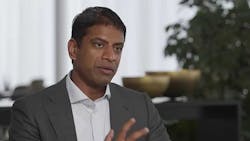Novartis Figuring Out How to Keep Brand Intact After Lobby Furor
Novartis needs to regain public trust and rethink the way it does business with consulting firms, lobbyists and other business groups.
A week after Novartis AG had to explain its entanglement in Special Counsel Robert Mueller’s investigation, CEO Vas Narasimhan dialed into a conference call of epic proportions.
On the receiving end: 5,000 of his top managers.
Narasimhan’s urgent message, according to a person familiar with the situation, was that Novartis needs to regain public trust and rethink the way it does business with consulting firms, lobbyists and other business groups.
That’s after the surprise disclosure that the Swiss pharmaceutical company paid $1.2 million to a consulting firm led by Donald Trump’s personal lawyer, Michael Cohen, an arrangement the CEO later called a mistake.
The CEO is preparing to meet investors at an event Wednesday in Novartis’s hometown of Basel. Novartis is completing a review to determine its next steps after an internal investigation -- conducted with outside advisers and completed in November -- found the company didn’t do anything illegal, said the person, who asked not to be named because the information isn’t public.
The controversy poses a challenge for Narasimhan, a 13-year company veteran who replaced Joe Jimenez atop the Swiss drugmaker in February. An American, Harvard-trained physician, Narasimhan is seeking to reshape Novartis’s culture after a series of allegations of improper sales practices, while accelerating efforts to find breakthrough products to replace aging blockbusters. Novartis declined to comment.
Narasimhan is grappling with questions about a one-year, $100,000-a-month agreement with Cohen’s Essential Consultants LLC that was aimed at gaining insight into health-care policies under the new administration. Novartis said that it hired the company in 2017, while Jimenez was still CEO. The drugmaker said that even though it determined after a single meeting that the firm would be unable to provide the services it anticipated and decided not to engage further, it was contractually bound to keep making monthly payments.
Bolstering Compliance
Narasimhan had no involvement in the arrangement with Cohen’s firm, Novartis said. The company had moved to bolster its compliance policies and team in recent months, elevating Shannon Klinger, the top compliance and ethics officer, to the executive committee.
Mueller’s investigators questioned Novartis in November, according to the company. Now, a key question the CEO faces is why it’s the only drugmaker that’s been drawn into the saga.
Jimenez, who couldn’t be reached for comment, was chosen in January 2017 as chairman-elect of Pharmaceutical Research and Manufacturers of America, the U.S. lobbying group. The former Novartis CEO was among top drug executives who met with the president in Washington in early 2017 to discuss drug pricing soon after Trump had declared that the industry was “getting away with murder.”
Lawmaker Letters
The president said last week he wants to increase competition, cut list prices and reduce patients’ out-of-pocket costs for U.S. patients. Still his plan doesn’t include some of the harshest steps the industry had feared, such as allowing the U.S. Medicare program to negotiate on drug prices.
Senator Ron Wyden last week asked Novartis’s CEO to explain what the drugmaker was hoping to achieve with its payments to Cohen. The Democrat from Oregon wrote in a letter to Narasimhan that at the time Novartis was paying Cohen, it was seeking approval and negotiating a payment deal with the U.S. government for cancer drug Kymriah that has a list price of $475,000.
Democratic Senators Elizabeth Warren of Massachusetts and Richard Blumenthal of Connecticut sent a letter to Narasimhan on May 14. saying that the payments appear to be “stunningly irresponsible” and demanding answers to questions about how they occurred. The lawmakers sent a similar letter to Randall Stephenson, chairman of AT&T Inc., which also made payments to Cohen.
By James Paton
About the Author
Bloomberg
Licensed content from Bloomberg, copyright 2016.
